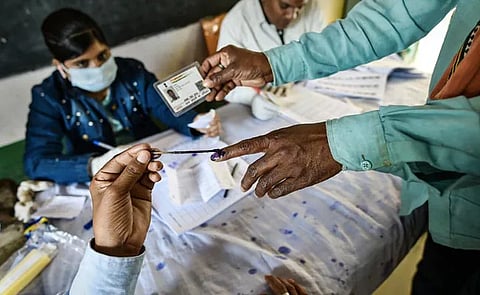
New Delhi- Throughout Tamil Nadu, a myriad of grievances, ranging from infrastructural neglect to social discrimination, converge, fostering a sense of disillusionment among various communities.
These voices of discontent raise pertinent questions about inclusivity, governance, and social justice, emphasizing the need for meaningful dialogue and redressal of grievances beyond electoral rhetoric.
Recently, a group of villagers from the scheduled caste (SC) community near Radhapuram took a stand against electoral politics on April 17 by plastering wall posters in the area. They declared their intention to boycott the upcoming Lok Sabha elections, citing their dissatisfaction with the denial of permission to conduct the Nithya Kalyani Ambal temple festival while the temple flag remains raised atop the shrine.
According to SC residents hailing from 12 villages, including Ilaiyanayinarkulam, Kariyakulam, Neduvaali, Pattarkulam, Thiruma Nagar, and Pappankulam, they have traditionally been allowed to organize the temple festival only after the temple flag is lowered. This customary practice has endured for the past 38 years.
The Nithya Kalyani Ambal temple's 10-day festival, overseen by the Hindu Religious and Charitable Endowment (HR & CE) department, is a collaborative effort involving various communities, including Dalit and Bahujan communities, each year.
Rajkumar, a local resident, explained that officials typically allocate one or two days to these communities for hosting the festival.
He further stated, "The festival commences with a flag-raising ceremony, which lasts for 10 days. While the BC and MBC communities can conduct their celebrations during this period, the SC community is only granted permission to hold their festival on the 11th day, after the flag is lowered.”
“This disparity is unjust,” he continued, “and as a form of protest, we intend to abstain from participating in the election.”
Shalin Maria Lawrence, a Dalit activist and Research Scholar, utilized X (formerly Twitter) to shed light on the issue, emphasizing that the Dalit Colonies in 2024 are determined to hold those in power accountable and make them feel ashamed of their actions. However, she lamented that these authorities continue to boast about their purported progressiveness without showing any remorse.
The Mooknayak spoke to TN Kangraj, the State Secretary of Tamil Nadu Untouchability Eradication Front. He assured that DMK’s cabinet minister Anitha Radhakrishnan will himself look into the matter and solve it, but after the election.
He further stated that he would encourage the community members to go and use their right to vote.
In Vengavayal, Pudukottai district, villagers express frustration over the unresolved issue of contaminated drinking water, vowing to abstain from voting until those responsible for mixing human waste into the water supply are apprehended.
Meanwhile, in Ennore, Chennai, residents demand the permanent closure of the Coromandel International Limited plant following an ammonia gas leak in 2023. Their dissatisfaction with the government's response fuels their threat to boycott the upcoming polls.
Similar sentiments resonate across different regions of Tamil Nadu. In Kannappar Thidal, Chennai, marginalized families demand better living conditions, including access to permanent housing, compelling them to consider abstaining from voting. Similarly, in Otteri Thideer Nagar, Chennai, inadequate sanitation facilities prompt residents to contemplate electoral boycotts.
In villages such as Panangudi, Narimanam, and Gopurajapuram in Nagapattinam district, discontent brews over alleged unfair compensation by the Chennai Petroleum Corporation Limited (CPCL) for land acquisition, leading to threats of electoral boycotts.
Furthermore, grievances extend to social discrimination, as seen in Radhapuram Taluk, Tirunelveli, where Dalit colonies protest against caste-based discrimination and exclusion from local temples. These unresolved social injustices drive communities to reject participation in the electoral process.
In remote tribal hamlets of Tirupathur and Udumalaipettai, lack of basic amenities and inadequate healthcare infrastructure propel residents to consider boycotting the polls, citing neglect by authorities.
Concerns also arise over environmental and livelihood impacts, such as in Thoothukudi, where farmers fear displacement due to a proposed graphite mining project. Similarly, in Erode district, villages within the Sathyamangalam Tiger Reserve express distress over increasing human-animal conflicts and lack of protective measures.
On Friday, April 19 , polls were held for 102 seats spanning 21 states, including Tamil Nadu with its 39 seats and the sole Puducherry constituency.
Anticipated to participate are approximately 6.23 crore voters in Tamil Nadu, who will engage across nearly 68,000 polling stations to decide the outcomes for 950 candidates.
In Tamil Nadu's political arena, the forthcoming election emerges as a three-sided contest featuring the current ruling party, Dravida Munnetra Kazhagam (DMK), the opposition All India Anna Dravida Munnetra Kazhagam (AIADMK), and the Bharatiya Janata Party (BJP). The voting process on April 19 serves as a critical moment in shaping India's political trajectory.
During the 2019 elections, Tamil Nadu recorded a turnout of 72.44%, underscoring its significant role in national politics. With its 39 Lok Sabha seats, the state ranks as the fifth highest in parliamentary representation across the nation.
You can also join our WhatsApp group to get premium and selected news of The Mooknayak on WhatsApp. Click here to join the WhatsApp group.